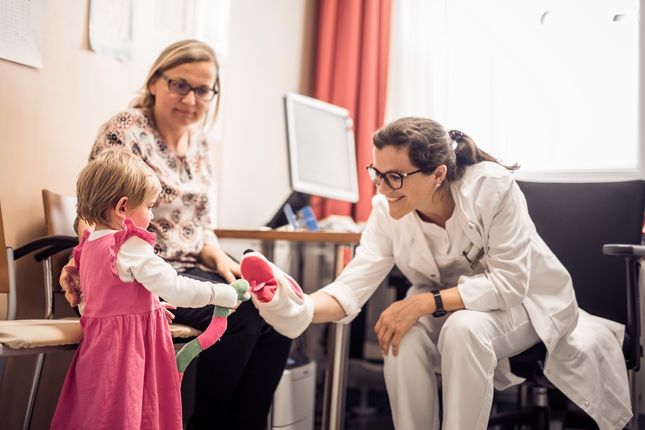Overcoming the challenge of clinical trials
Clinical trials and patient access
EB patients willing and able to participate in clinical trials are essential in the process of developing approved treatments, products and diagnostics.
Life with EB is difficult, and planning for clinical trials needs to take this into account. It is important to integrate patients in the planning of clinical trials, and companies planning trials are encouraged to contact patient organisations early in the process to ensure this happens.
Patient choice
Therapies in development recognise not only differences in genetic defect, but the differences in EB features that impact patients’ lives, and therefore acceptable risks: benefit profiles.
Most people with EB will have an individual approach to deciding what is the right balance of risk versus benefit in choosing a therapeutic approach to improve their own quality of life. It cannot be assumed that all patients with the same EB subtype, symptoms and prognosis will select the same treatment. This impacts on both clinical trial design and patient recruitment, as well as likely markets for treatments. Further research is required to refine concepts and processes to yield safer, more effective and ‘patient-friendly’ treatments.
It is likely that eventual ‘cures’ will combine various approaches currently in development, with novel technologies and therapeutic concepts as yet to emerge from fundamental research into EB.
Main challenges for EB patient organisations in promoting clinical translation
- Selecting which research to develop: with competing technologies and finite financial resources, EB Resnet is likely to have to choose to develop one type of therapy over another.
- Feasibility: in practice, therapies selected for development are likely to be those where there is the opportunity to create a safe, effective therapy that is affordable, for any type of EB. Consideration of issues such as market size, practicality of delivery and affordability under various reimbursement schemes have to be taken into account.
- Financial: to date, EB Resnet members have funded research up to the point of early-stage clinical trials (phase I/ 2); further development requires much greater funding, and this will require working in partnership with others, notably industry.
- Expertise: EB Resnet will benefit not only from increased financial resources through partnership, but also the advice of individuals and companies with experience and expertise in taking research through clinical trials, and regulatory approval, into the clinic.
Recommendations for overcoming some of these challenges
- Include patients in the clinical trials design from the start
- Carefully consider flexibility of eligibility criteria and ensure it is justified
- Try and open some ‘shared care’ sites such as GP practices or hospitals or meet patients at their home
- Help patients to book travel and hotels where possible and pay upfront from a study account
- Have early, late or weekend appointments available where possible to fit around patients' schedules.
Share knowledge about patients' needs & perspectives
Owing to legislation, EB Resnet cannot provide companies with direct access to patient registers or contact details of individual patients. However, for companies planning clinical trials, opportunities to participate in trials can be communicated to the patient community via EB Resnet. EB Resnet does not provide endorsement of specific treatments, trials or products. Patient recruitment for clinical trials can be facilitated through clinical-network partners. EB Resnet can help companies understand patient perspectives.
EB Resnet seeks industry and academic partners to overcome these challenges. Contact office@eb-researchnetwork.org if you want to partner.
DEBRA International
DEBRA International is the umbrella organisation for more than 50 national DEBRA groups. Find out more
EB Clinet
EB Clinet – Clinical Network for Epidermolysis Bullosa is a network of EB centres and experts which aims to improve medical care for people with EB and to accelerate the way to a cure by connecting health care professionals working with EB for the purpose of sharing knowledge and experience. Find out more



